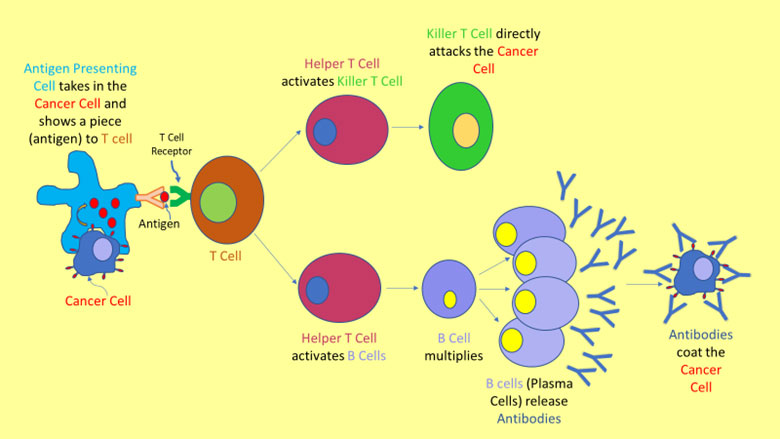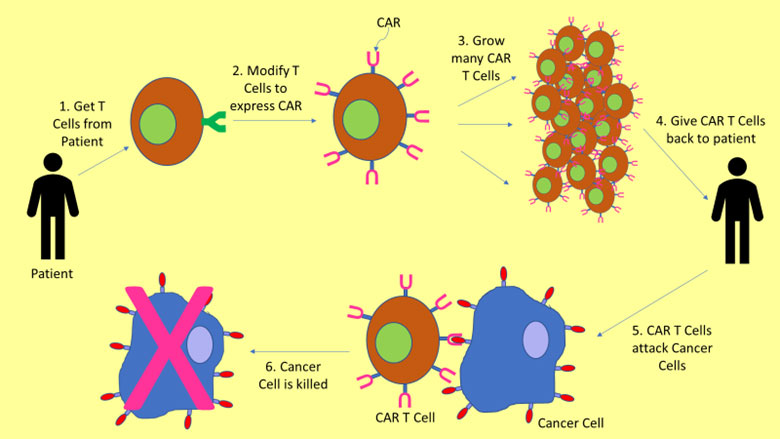By: Kathryn S. Sutton, MD, FAAP
Childhood cancer is
rare. The
treatment plan for each child with cancer will depend on the type of cancer and its location in the body.
Recently, scientists have developed ways to use the immune system to help treat cancer called targeted therapy or immunotherapy.
How can the immune system help treat cancer?
The immune system is the body's defense against infection (bacteria and viruses), allergens (like pollen) and cancer cells. Immune cells are called white blood cells.
The body learns over time to protect itself by making special white blood cells and proteins called antibodies.
When a cancer cell is in the body, white blood cells called Antigen Presenting Cells tell other white blood cells called Helper T cells to activate Killer T cells to destroy it. Helper T cells also activate B cells (another type of white blood cell) to make proteins called antibodies. Antibodies label the surface of the cancer cells so that other white blood cells can find and destroy it.

Types of immunotherapy
Research has found ways to treat cancer by increasing a person's own immune response to cancer cells in their body. This is called cancer immunotherapy.
Types of cancer immunotherapy include:
Antibodies. Just like the antibodies made by the immune system, doctors can give extra antibodies against the cancer cells. The body's normal white blood cells then find and kill the cancer cells.
Drugs that turn white blood cells on or off. Medications help to increase the body's immune response against cancer cells.
Tumor vaccines. In the same way that vaccines against infections cause the body to make antibodies to a virus or bacteria, tumor vaccines cause the body to make antibodies to cancer cells.
Cellular therapies. Giving special white blood cells to the patient that help to treat cancer cells. An example is
CAR T cells.
What are CAR T cells?
CAR T cells are a type of immunotherapy called cellular therapy. CAR stands for Chimeric Antigen Receptor. CARs are designed by scientists to attach to the surface of a person's white blood cells T cells.
Scientists take a patient's own Killer T cells from a blood draw and in the laboratory add a protein receptor that is specific for a cancer cell marker (antigen). This new receptor called a CAR allows the Killer T cell to find and attack the cancer cell. The new T cells are given back to the patient into the vein as cancer treatment.
What cancers can CAR T cells treat?
CAR T cells have been made to treat many types of cancer, including leukemias (cancers of the white blood cells) and lymphomas (cancers of the lymph nodes), solid tumors (cancers in different parts of the body) and brain tumors. In many cases CAR T cells are still in development or being studied in clinical trials with different success rates.
Do CAR T cells have side effects?
CAR T cells can cause side effects. These may include changes in heart rate, respiratory rate, blood pressure and brain function. The side effects are managed in the intensive care unit (ICU) with supportive medications.
CAR T cells for treating different cancers will have different side effects. For example, sometimes CAR T cells make patients prone to infections. Infusions of antibodies (IVIG) and special antimicrobial agents can be given to help fight infection.
Talk with your child's doctor
If you or your child has cancer, you can talk with their oncologist (a doctor that treats cancer) to find out if CAR T cell therapy is the right treatment for the cancer.

More information
About Dr. Sutton
 Kathryn S. Sutton, MD, FAAP, a member of the American Academy of Pediatrics Section on Hematology Oncology, is a pediatric hematologist/oncologist on the Solid Tumor Team at the Aflac Cancer and Blood Disorders Center of Children's Healthcare of Atlanta and an Assistant Professor of Pediatrics at Emory University School of Medicine. Kathryn S. Sutton, MD, FAAP, a member of the American Academy of Pediatrics Section on Hematology Oncology, is a pediatric hematologist/oncologist on the Solid Tumor Team at the Aflac Cancer and Blood Disorders Center of Children's Healthcare of Atlanta and an Assistant Professor of Pediatrics at Emory University School of Medicine.
|
Infographics courtesy Kathryn S. Sutton, MD, FAAP
|